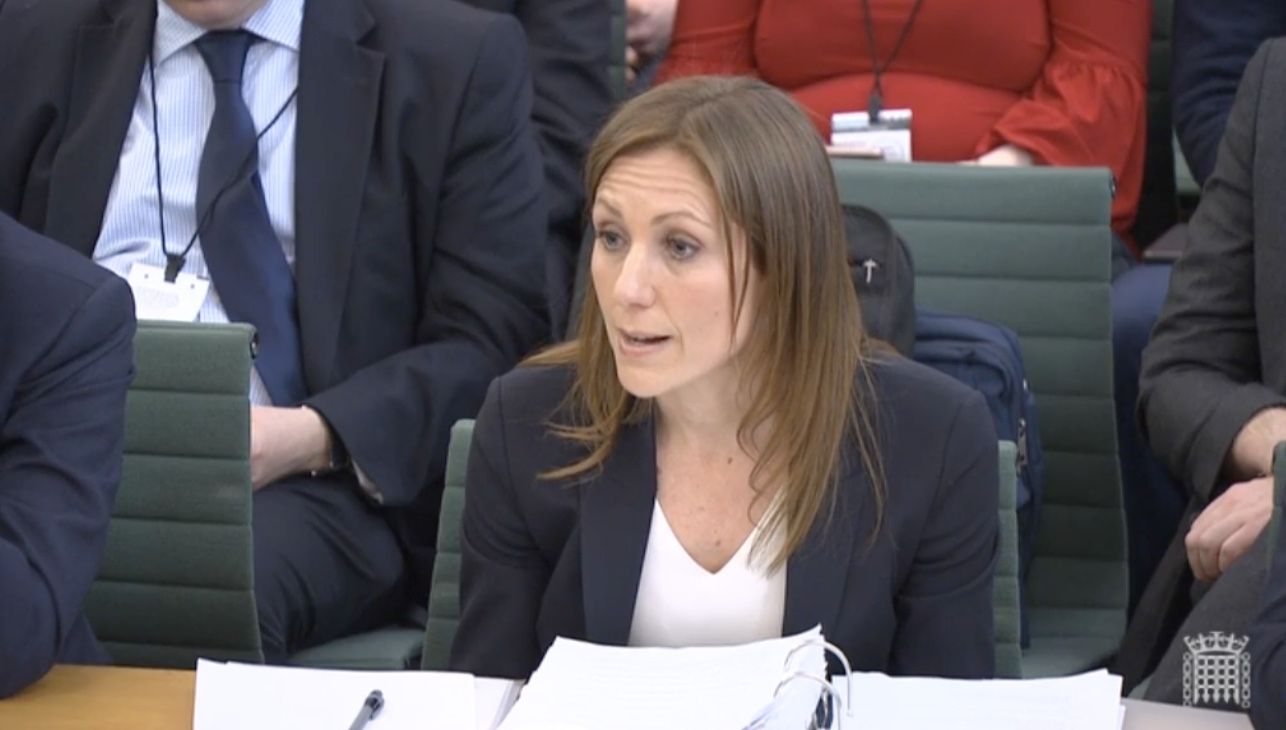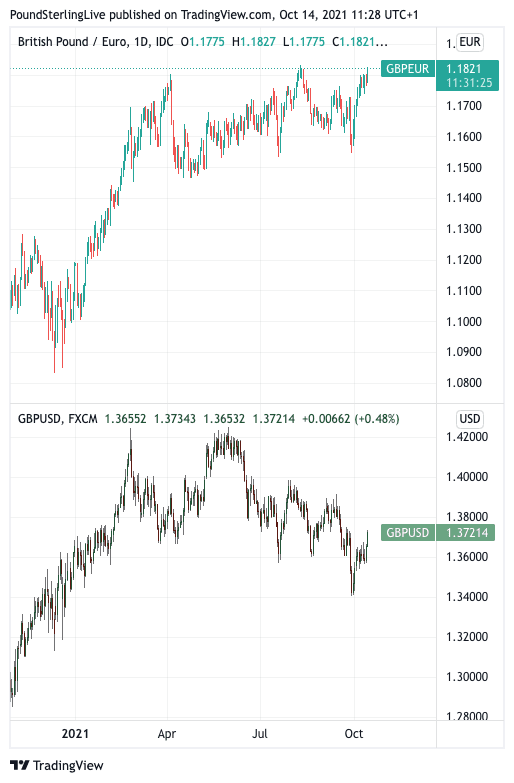Pound Sterling Advances Despite a Dovish Tenreyro
- Written by: Gary Howes
- GBP higher in tandem with improved investor sentiment
- And despite 'dovish' interest rate comments
- Tenreyro says UK inflation surge to be temporary
- Economists divided on whether higher rates are good or bad for GBP

Above: File image of Silvana Tenreyro © UK Parliament, Pound Sterling Live.
- Market rates at publication:
GBP/EUR: 1.1782 | GBP/USD: 1.3608 - Bank transfer rates:
1.1550 | 1.3324 - Specialist transfer rates:
1.1720 | 1.3537 - For a specialist rate quote, see here
- Set an exchange rate alert, here
The British Pound advanced above 1.18 against the Euro and 1.37 against the Dollar amongst a palpable improvement in global investor sentiment and despite comments from one of the Bank of England's most 'dovish' members.
Monetary Policy Committee (MPC) member Silvana Tenreyro said she viewed the current surge in UK inflation levels as being temporary and she offered little concern about the prospect of inflation persisting over coming months.
The comments cast her as a 'dove' in that she is unlikely to advocate for higher interest rates at the Bank of England in the near future.
In a virtual meeting with Welsh businesses, Tenreyro said current inflationary pressures should prove temporary.
She said she differed from her former colleague on the MPC Andy Haldane who had argued inflation expectations risks moving substantially higher as a result of the ongoing economic shock.
She said raising interest rates to counter increasing prices in areas such as energy and semiconductors would be "self-defeating" if those rises prove to be one-offs.
She also said interest rates could in fact fall to below -0.75%, a reflection that signals a resistance to raising interest rates from current record lows.
Foreign exchange markets are currently focussed on when the world's various central banks will raise interest rates, favouring those currencies belonging to early movers.
Money market pricing suggests the Bank of England is amongst these first movers with a small hike anticipated before year end and as much as three further hikes seen in 2022.
The Pound's rally higher in the wake of Tenreyro's comments reflect two things: 1) her reputation as an arch dove means her view on inflation being temporary is hardly a surprise and 2) the market views her comments as being insufficient to prevent a majority for rate hikes at impending meetings.
Above: GBP/EUR daily (top) and GBP/USD daily (bottom).
Secure a retail exchange rate that is between 3-5% stronger than offered by leading banks, learn more.
The Pound to Euro exchange rate rallied back above 1.18 on Thursday, despite Tenreyro's comments while the Pound to Dollar exchange rate went above 1.37.
What comes next for the Pound vis a vis the Bank of England is interesting: Some analysts are arguing that if the Bank raises rates in November the Pound will fall, others say if they forgo a rate rise they disappoint markets and the Pound still falls.
"We reiterate our warning that UK money markets have gone ahead of themselves discounting an aggressive BoE tightening cycle to start soon, as any reversal could in turn weigh on the GBP," says Valentin Marinov, Head of G10 FX Strategy at Crédit Agricole.
Marinov's view of what a pushback on rate hike expectations means for a currency (weakness) is a traditional view.
But the argument that a rate rise is now in fact bad for the Pound is built on the assumption that raising rates constitutes a 'policy mistake' in that it raises the cost of finance for an economy witnessing slowing growth.
"There is no shortage of commentators, including ourselves, warning that this pace of rate hikes in the UK could place too much of a burden on the consumer in the current environment," says Jane Foley, Senior FX Strategist at Rabobank.
{wbamp-hide start}
{wbamp-hide end}{wbamp-show start}{wbamp-show end}
The argument here is that the Bank of England acts as a headwind to growth and therefore the Pound falls.
Shahab Jalinoos, Head of FX Strategy at Credit Suisse reflects there now exists "a popular notion in the market that GBP has to fall whatever happens".
"Either because the BoE ends up more dovish than the market is pricing in or because the BoE delivers early rate hikes to subdue inflation and ends up making a “policy mistake” by hiking into a weakening growth outlook," says Jalinoos in a note out October 13.
BMO Capital Markets find that there is some credence to the argument that investors are no longer seeing Bank of England hikes as supportive of Sterling.
Their recent research shows the Pound is now less sensitive to interest rate expectations.
"The GBP has behaved as a risk-sensitive currency rather than a rate-sensitive one," says Stephen Gallo, European Head of FX Strategy at BMO Capital.
"Anecdotal evidence we've picked up also suggests that some leveraged funds have bought into the idea that interest rate hikes will be severely damaging for the UK economy, particularly in view of the squeeze from the supply-side," he says.
BMO Capital say the likelihood of the Bank of England hiking interest rates before January is lower than what is currently factored into the curve.
Do they see this as being a negative for Sterling, as per the view of Crédit Agricole's Marinov?
BMO Capital note that investors actually reduced their 'long' exposure to the Pound (i.e. closed out bets that would deliver profit if the Pound rose in the future) at the same time expectations for a Bank of England rate hike increased.
"This leads us to believe that the positive impact on risk sentiment from pre-2022 rate hikes being pulled out of the curve will more or less cushion the trade-weighted GBP," says Gallo.
The prospect of a sharp selloff if markets cancel out expectations for a November rate rise is therefore not likely to be elevated.
Indeed, if those who say the Pound has suffered on rising rate hike expectations are correct, then the Pound could even benefit if it becomes clear the Bank will forgo a November rate rise and opt to hike in February.






